Sydney Writers Walk
Der Sydney Writers Walk ist ein Fußweg am Circular Quay in Sydney, New South Wales, Australien, auf dem 60 kreisförmige Metalltafeln zu Ehren von Schriftstellern eingebettet sind.
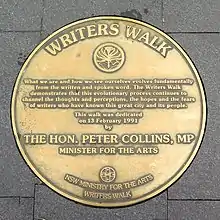
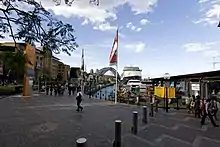
Im Jahr 1991 wurden vom Kunstministerium des australischen Bundesstaates New South Wales auf einem Fußweg zwischen dem Kreuzfahrtterminal und dem Sydney Opera House 49 Metallplaketten angebracht, um das Leben und Werk bekannter australischer Schriftsteller, sowie namhafter ausländischer Autoren wie D. H. Lawrence, Joseph Conrad und Mark Twain, die in Australien lebten oder Australien besuchten, zu ehren.[1] Auf jeder Plakette kann man Zitate aus einem bedeutenden Werk und einige biografische Informationen über den Schriftsteller lesen. Im Jahr 2011 wurde der Sydney Writers Walk erweitert und elf weitere Plaketten hinzugefügt.[2]
Einige der biografischen Informationen auf den Metallplaketten sind nicht mehr aktuell. Es wurde bisher versäumt, bei zwischenzeitlich verstorbenen Schriftstellern das Sterbejahr auf der Plakette zu ergänzen.[3]
Liste der geehrten Schriftsteller
Mit einem Sternchen * gekennzeichnete Schriftsteller wurden 2011 hinzugefügt.[2]
| Plakette | Autor | Lebensdaten | Zitat | Werk |
|---|---|---|---|---|
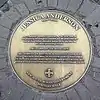 |
Jessica Anderson * | 1916–2010 | In ... Sydney I became conscious for the first time of the points of the compass, and felt for the first time the airs of three other climates, borne onto my skin by the three prevailing winds. | Tirra Lirra by the River (1978) |
 |
Thea Astley | 1925–2004 | Queensland isn't the home of the tall yarn. It's where the tall yarn happens, acted out on a stage where, despite its vastness, the oddballs see and recognise each other across the no-miles and wave their understanding. | Being a Queenslander (1976) |
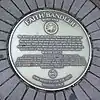 |
Faith Bandler | 1918–2015 | The blueness of the sky folded into the sea and it was never-ending. It was always like this. Everything was eternal. The moons came and went and came again. The sun came every day. When the dark thick clouds which brought the rain covered the sun, there was no need to think about them, even to notice them, because the sun would come again. | Wacvie (1977) |
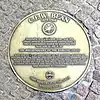 |
C.E.W. Bean | 1879–1968 | Australia is a big blank map, and the whole people is constantly sitting over it like a committee, trying to work out the best way to fill it in. | The Dreadnought of the Darling (1911) |
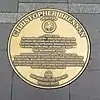 |
Christopher Brennan | 1870–1932 | ...I know I am the wanderer of the ways of all the worlds, to whom the sunshine and the rain are one and one to stay or hasten, because he knows no ending of the way, no home, no goal... |
The Wanderer (1913) |
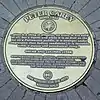 |
Peter Carey | 1943– | ... glass is a thing in disguise, an actor, is not solid at all, but a liquid, and while it is as frail as the ice on a Parramatta puddle, it is stronger under compression than Sydney sandstone ... it is invisible, solid, a joyous and paradoxical thing ... | Oscar and Lucinda (1988) |
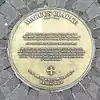 |
Marcus Clarke * | 1846–1881 | All the wealth in the world could not purchase the self-respect which had been cut out of him by the lash, or banish from his brain the memory of his degradation. | For the Term of His Natural Life (1874) |
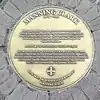 |
Manning Clark * | 1915–1991 | The proposals for the use of a southern continent had a history almost as long though by no means so distinguished as the history of its discovery. Some saw it as land dedicated to the Holy Spirit; some saw it as a land fit only for the refuse of society. | A History of Australia Volume 1 (1962) |
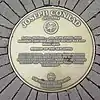 |
Joseph Conrad | 1857–1924 | Sydney Harbour ... one of the finest, most beautiful, vast, and safe bays the sun had ever shone upon. | Mirror of the Sea (1906) |
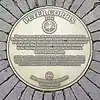 |
Peter Corris | 1942–2018 | The sun was going down as I stop-started along in the lane for drivers who didn't have the right money to pay the toll. The sky was clear and the water turned red-gold. The ferries and sailing ships seemed to be skating across a sheet of beaten bronze. | Wet Graves (1981) |
 |
Dymphna Cusack * | 1902–1981 | Around them the jacaranda broke in a purplish shower, motionless, airy and unreal, as though all the bright morning was caught up in a fragile net of blossom. | Jungerau (1936) |
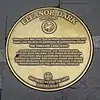 |
Eleanor Dark | 1901–1985 | Silence ruled this land. Out of silence mystery comes, and magic, and the delicate awareness of unreasoning things. | The Timeless Land (1941) |
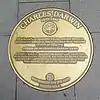 |
Charles Darwin | 1809–1882 | This is really a wonderful Colony; ancient Rome, in her Imperial grandeur, would not have been ashamed of such an offspring. | Letter from Charles Darwin (1836) |
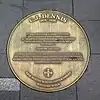 |
C.J.Dennis | 1876–1938 | It appened this way: I 'ad jist come down, After long years, to look at Sydney town. An' 'struth! Was I knocked endways? Fair su'prised? I never dreamed! That arch that cut the skies! The Bridge! ... |
I Dips Me Lid (1936) |
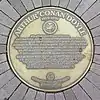 |
Arthur Conan Doyle | 1859–1930 | We all devoted ourselves to surf-bathing, spending a good deal of our day in the water as is the custom of the place. It is a real romp with Nature, for the great Pacific rollers come sweeping in and break over you, rolling you over on the sand if they can catch you unawares. It was a golden patch in our restless lives. | The Wanderings of a Spiritualist (1921) |
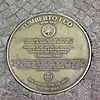 |
Umberto Eco | 1932–2016 | L'Australia non è solo agli antipodi, è lontana da tutto, talora anche da se stessa.
|
L'Espresso (1982) |
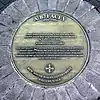 |
A.B. Facey * | 1894–1982 | I have lived a very good life, it has been very rich and full. I have been very fortunate and I am thrilled by it when I look back. | A Fortunate Life (1981) |
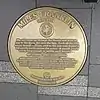 |
Miles Franklin | 1879–1954 | The sun came up through the Heads and stole its way to the Quay, far over the bay. Each of the tiny waves turned to flame, and as the sun rose higher it left pearly tracks across the water. A month would not be long enough to imbibe such beauty ... | My Career Goes Bung (1946) |
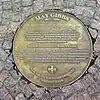 |
May Gibbs | 1877–1969 | Humans are as strong as the Wind, swift as the River, fierce as the Sun ... They whistle like the birds; they are as cruel as the snake. They have many skins which they take off many times. When all the skins are off the Human looks like a pale frog. | Tales of Snugglepot and Cuddlepie (1939) |
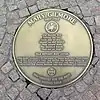 |
Mary Gilmore | 1865–1962 | Old Botany Bay Taking the sun Shame on the mouth That would deny The knotted hands That set us high! |
Old Botany Bay (1918) |
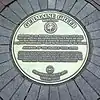 |
Germaine Greer | 1939– | Australia is my birthplace but I cannot call it my own as well as my native land, for I have no right to live there. Until a treaty is agreed with the original inhabitants, I shall be homeless in the world. | Journal Of The Plague Year (1988) |
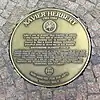 |
Xavier Herbert | 1901–1984 | Like a city in a dream, that Capital to which I was bound rose out of verdant plains to meet my seeking eye, to become, as I neared it, like a lovely woman extending jewelled arms to draw me to her bosom. | Disturbing Element (1963) |
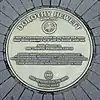 |
Dorothy Hewett | 1923–2002 | I had a tremendous world in my head and more than three-quarters of it will be buried with me. | The Chapel Perilous (1971) |
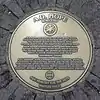 |
A.D. Hope | 1907–2000 | ... Yet there are some like me turn gladly home from the lush jungle of modern thought, to find The Arabian desert of the human mind, hoping, if still from the deserts the prophets come, Such savage and scarlet as no green hills dare Springs in that waste, some spirit which escapes The learned doubt, the chatter of cultured apes Which is called civilization over there. |
Australia (1939) |
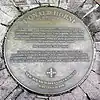 |
Donald Horne * | 1921–2005 | The good qualities of Australians ... their non-doctrinaire tolerance, their sense of pleasure, their sense of fair play, their interest in material things, their sense of family, their identity with nature ... their scepticism, their talent for improvisation, their courage and stoicism. These are great qualities that could constitute the beginnings of a great nation. | The Lucky Country (1964) |
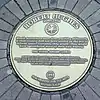 |
Robert Hughes | 1938–2012 | Would Australians have done anything differently if their country had not been settled as the jail of infinite space? Certainly they would. They would have remembered more of their own history. | The Fatal Shore (1987) |
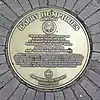 |
Barry Humphries | 1934– | I think that I could never spy A poem lovely as a pie. A banquet in a single course Blushing with rich tomato sauce. |
Neglected Poems and Other Creatures (1991) |
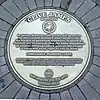 |
Clive James | 1939–2019 | In Sydney Harbour ... the yachts will be racing on the crushed diamond water under a sky the texture of powdered sapphires. It would be churlish not to concede that the same abundance of natural blessings which gave us the energy to leave has every right to call us back. | Unreliable Memoirs (1980) |
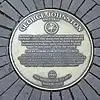 |
George Johnston | 1912–1970 | Sydney is a city of light and wind more than of architecture ... The majesties of nature and the monstrosities of man have a cheek by jowl evidence in Sydney more insistent, I think, than in any other city in the world. | Clean Straw for Nothing (1969) |
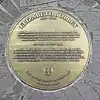 |
Elizabeth Jolley * | 1923–2007 | One day poets will come and teach the inhabitants of this strange country to look on the loveliness around them. Each of us creates his own vision of Australia and we see with our minds and our memories as much as with our eyes. | Central Mischief (1992) |
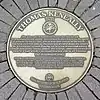 |
Thomas Keneally | 1935– | The place which had been chosen for this far-off commonwealth and prison, and named Sydney Cove (in the spirit of events), faced the sun, which was always in the north ... The land on either side of the cove was divided down the middle by a freshwater stream flowing out of a low hinterland among cabbage-tree palms, native cedars, the strange obdurate eucalyptus trees of a type which ... occurred nowhere else in all creation. | The Playmaker (1987) |
 |
Rudyard Kipling | 1865–1936 | Sydney . . . was populated by leisured multitudes all in their shirt-sleeves and all picnicking all the day. They volunteered that they were new and young, but would do wonderful things some day. | Something of Myself (1937) |
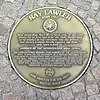 |
Ray Lawler | 1921– | How about that, Roo? We've been goin' to the same places for so long and doin' the same things that we've started to run ourselves into the ground . . . And there's a whole bloody country out there - wide open before us. | Summer of the Seventeenth Doll (1955) |
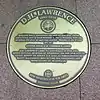 |
D.H. Lawrence | 1885–1930 | Australia has a marvellous sky and air and blue clarity and a hoary sort of land beneath is, like a Sleeping Princess on whom the dust of ages has settled. Wonder if she'll ever get up. | Letter from D. H. Lawrence (1922) |
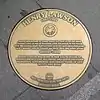 |
Henry Lawson | 1867–1922 | And of afternoons in cities, when the rain is on the land, Visions come to me of Sweeney with his bottle in his hand, With the stormy night behind him, and the pub verandah-post - And I wonder why he haunts me more than any other ghost. |
Sweeney (1893) |
 |
Jack London | 1876–1916 | I would rather be ashes than dust, a spark burnt out in a brilliant blaze, than be stifled in dry rot . . . For man's chief purpose is to live, not to exist; I shall not waste my days trying to prolong them; I shall use my time. | South Sea Tales (1911) |
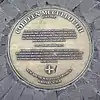 |
Colleen McCullough * | 1937–2015 | The bird with the thorn in its breast, it follows and immutable law; it is driven by it knows not what to impale itself, and die singing ... But we, when we put the thorns in our breasts, we know. We understand. And still we do it. Still we do it. | The Thorn Birds (1977) |
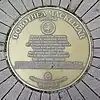 |
Dorothea Mackellar | 1885–1968 | I love a sunburnt country, A land of sweeping plains, Of ragged mountain ranges, Of droughts and flooding rains. I love her far horizons, I love her jewel-sea, Her beauty and her terror - The wide brown land for me! |
My Country (1911) |
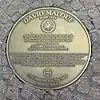 |
David Malouf | 1934– | Australia is still revealing itself to us. We oughtn't to close off possibilities by declaring too early what we have already become. | "Lugarno Postscript", Notes and Furphies (1979) |
 |
James A. Michener | 1907–1997 | Mankind was destined to live on the edge of perpetual disaster. We are mankind because we survive. We do it in a half-assed way, but we do it. | Chesapeake (1978) |
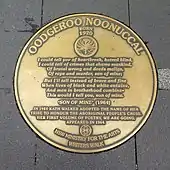 |
Oodgeroo Noonuccal | 1920–1993 | I could tell you of the heartbreak, hatred blind, I could tell of crimes that shape mankind, Of brutal wrongs and deeds malign, Of rape and murder, son of mine; But I'll tell instead of brave and fine When lives of black and white entwine. And men in brotherhood combine - This would I tell you, son of mine. |
Son of Mine (1964) |
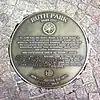 |
Ruth Park | 1917–2010 | To walk into the Opera House is to walk inside a sculpture, or perhaps a seashell, maybe an intricate, half-translucent nautilus. Morphology and the computers have composed a world of strange breathless shapes, vast, individual, quite unlike any other architecture. | The Companion Guide to Sydney (1973) |
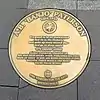 |
A.B. ‘Banjo’ Paterson | 1864–1941 | It's grand to be an unemployed And lie in the Domain, And wake up every second day - And go to sleep again. |
It's Grand (1902) |
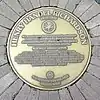 |
Henry Handel Richardson | 1870–1946 | No one is less lenient towards romantic longings than he who has suffered disappointment in them, who has failed to transmute them into reality. | Maurice Guest (1908) |
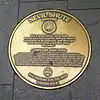 |
Nevil Shute | 1899–1960 | "It's a funny thing", Jean said. "You go to a new country, and you expect everything to be different, and then you find there's such a lot that stays the same". | A Town Like Alice (1950) |
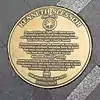 |
Kenneth Slessor | 1901–1971 | The red globes of light, the liquor-green, The pulsing arrows and the running fire Spilt on the stones, go deeper than the stream; You find this ugly, I find it lovely. Ghost's trousers, like the dangle of hung men, In pawnshop windows, bumping knee by knee, But none inside to suffer or condemn You find this ugly, I find it lovely. |
William Street (1939) |
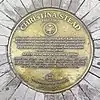 |
Christina Stead | 1902–1983 | This land was last discovered; why? A ghost land, this continent of mystery . . . Its heart is made of salt; it suddenly oozes from its burning pores, gold which will destroy men in greed, but not water to give them drink. | Seven Poor Men of Sydney (1934) |
 |
Robert Louis Stevenson | 1850–1894 | ... there is material for a dozen buccaneering stories to be picked up in the hotels at Circular Quay. | Robert Louis Stevenson, His Association With Australia - Mackaness (1935) |
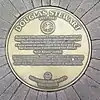 |
Douglas Stewart | 1913–1985 | Australia's the violent country; the earth itself Suffers, cries out in anger against the sunlight From the cracked lips of the plains ... I have come to understand it in love and pity; Not horror now; I understand the Kellys. |
Ned Kelly (1943) |
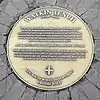 |
Watkin Tench * | 1758–1833 | The wind was now fair, the sky serene ... the temperature of the air delightfully pleasant: joy sparkled in every countenance, and congratulations issued from every mouth. Ithaca itself was scarcely more longed for by Ulysses, than Botany Bay by the adventurers who had traversed so many thousand miles to take possession of it. | A Narrative of the Expedition to Botany Bay (1789) |
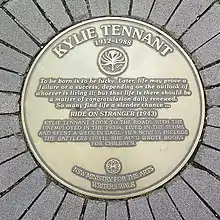 |
Kylie Tennant | 1912–1988 | To be born is to be lucky. Later, life may prove a failure or a success, depending on the outlook of whoever is living it; but that life is there should be a matter of congratulation daily renewed. So many find life a slender chance ... | Ride On Stranger (1943) |
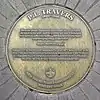 |
P. L. Travers * | 1899–1996 | Then the shape, tossed and bent under the wind, lifted the latch of the gate, and they could see that it belonged to a woman, who was holding her hat on with one hand and carrying a bag in the other. | Mary Poppins (1934) |
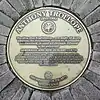 |
Anthony Trollope | 1815–1882 | The idea that Englishmen ... are made of paste, whereas the Australian, native or thoroughly acclimatized, is steel all through, I found to be universal. | Australia and New Zealand (1873) |
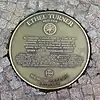 |
Ethel Turner | 1872–1958 | In Australia a model child is - I say it not without thankfulness - an unknown quantity . . . There is a lurking sparkle of joyousness and rebellion and mischief in nature here, and therefore in children. | Seven Little Australians (1894) |
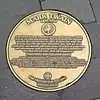 |
Mark Twain | 1835–1910 | Australian history is almost always picturesque, indeed it is so curious and strange, that it is itself the chiefest novelty the country has to offer. It does not read like history but like the most beautiful lies. And all of a fresh sort, not mouldy old stale ones. It is full of surprises, and adventures and incongruities, and incredibilities, but they are all true, they all happened. | Following the Equator (1897) |
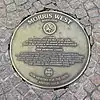 |
Morris West | 1916–1999 | ... I claim No private lien on the truth, only A liberty to seek it, prove it in debate, And to be wrong a thousand times to reach A single rightness ... |
The Heretic (1969) |
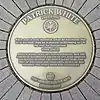 |
Patrick White | 1912–1990 | When man is truly humbled, when he has learnt that he is not God, then he is nearest to becoming so. In the end, he may ascend. | Voss (1957) |
 |
David Williamson | 1942– | In Melbourne, all views are equally depressing, so there's no point in having one. ... No one in Sydney ever wastes time debating the meaning of life - it's getting yourself a water frontage. People devote a lifetime to the quest. | Emerald City (1987) |
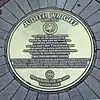 |
Judith Wright | 1915–2000 | I am born of the conquerors, you of the persecuted. Raped by rum and an alien law, progress and economics. are you and I and a once-loved land peopled by tribes and trees; doomed by traders and stock exchanges, bought by faceless strangers. |
Two Dreamtimes (1973) |
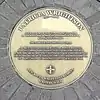 |
Patricia Wrightson * | 1921–2010 | And something else lives in the swamp: something sly and secret, half as old as the mountain. On a still day you may hear it chuckle. | The Nargun and the Stars (1973) |
Weblinks
Einzelnachweise
- Sydney Writers Walk. In: Weekend Notes. 31. Mai 2015, abgerufen am 13. Juni 2020 (englisch).
- Media Release. (PDF, (53 KB)) Minister for the Arts, 24. Oktober 2011, abgerufen am 13. Juni 2020 (englisch).
- Outdated plaques along Circular Quay Writers’ Walk to finally get attention. In: The Daily Telegraph. 27. Juli 2017, abgerufen am 13. Juni 2020 (englisch).